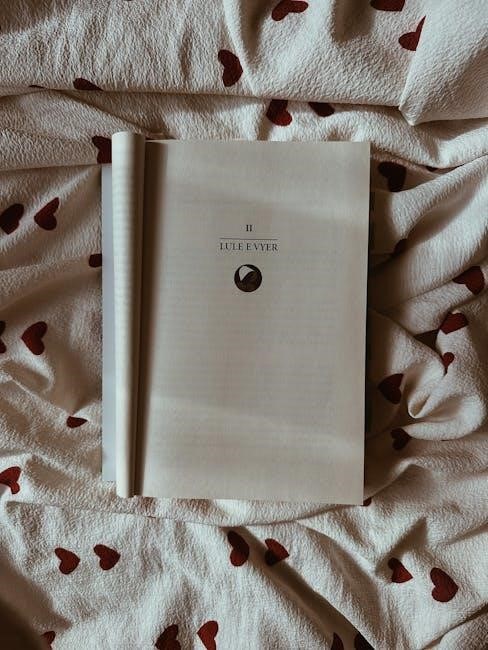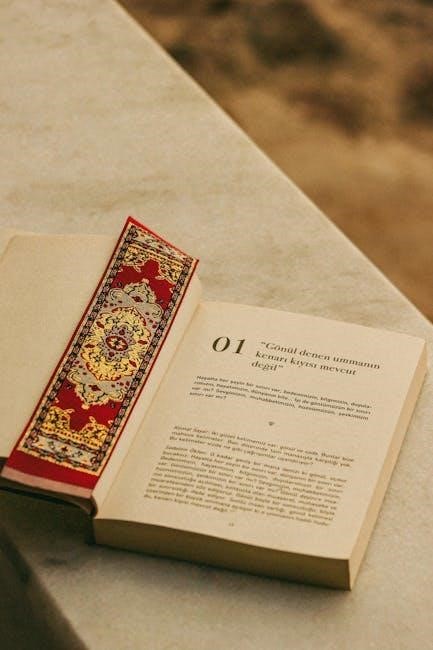John Connolly’s The Book of Lost Things is a captivating novel about grief, love, and redemption, available in PDF, EPUB, and Kindle formats for easy access.
1.1 Publication Details and Background
The Book of Lost Things by John Connolly was published in 2006 by Simon and Schuster and spans 353 pages. It is available in PDF, EPUB, and Kindle formats, making it accessible to a wide range of readers. The book has gained popularity for its unique blend of grief, loss, and imaginative storytelling. Readers can download or purchase it from various platforms, including OverDrive and Litres, ensuring easy access to this captivating novel.
1.2 Overview of the Book’s Central Theme
The Book of Lost Things explores themes of grief, loss, and redemption through David’s emotional journey. The novel delves into how stories and imagination serve as coping mechanisms for life’s hardships. Connolly’s dark and imaginative storytelling weaves fairy tales into a poignant exploration of growing up, blending harsh realities with fantastical elements. The book highlights the transformative power of stories, offering solace and hope amid personal struggles, making it a compelling read for both young and adult audiences.

Plot Summary of “The Book of Lost Things”
The Book of Lost Things follows David, a grieving boy who enters a twisted fairy tale world after his mother’s death, seeking redemption and self-discovery.
2.1 The Journey of the Protagonist, David
David, a young boy struggling with the loss of his mother, escapes into a world of twisted fairy tales. His journey through this dark, imaginative realm forces him to confront grief, loyalty, and the power of stories. Along the way, he encounters both heroes and monsters, leading to a transformative quest for self-discovery and redemption. This PDF version captures his poignant and magical adventure vividly.
2.2 The Blending of Reality and Fairy Tales
The Book of Lost Things masterfully intertwines David’s real-world grief with a dark, fantastical realm. The story reimagines classic fairy tales in twisted, ominous ways, reflecting David’s emotional turmoil. As he navigates a forest filled with wolves, monsters, and heroes, the lines between reality and fantasy blur. This blend creates a haunting yet enchanting narrative, where mythical creatures and beloved tales reveal deeper truths about loss, love, and growing up. The PDF version captures this duality vividly.

Key Themes Explored in the Book
The novel delves into grief, loss, and redemption, highlighting the power of stories and imagination. It also explores family dynamics and the enduring impact of love.
3.1 Grief, Loss, and Redemption
David’s journey in The Book of Lost Things is deeply rooted in his struggle with grief and loss, particularly after his mother’s death. The novel explores how stories and imagination serve as coping mechanisms, offering solace and redemption. Through his experiences in a fantastical world, David learns to navigate his emotions, finding strength in the bonds of love and the enduring power of stories. Connolly masterfully weaves these themes, creating a poignant and transformative narrative.
3.2 The Power of Stories and Imagination
In The Book of Lost Things, stories and imagination are presented as powerful tools for coping with life’s challenges. David’s journey highlights how fairy tales and myths provide solace and guidance, blending reality with fantasy. The novel underscores the transformative power of imagination, as David navigates a world of twisted stories to find his path. Connolly’s exploration of this theme emphasizes how stories can shape identity, offer escape, and ultimately lead to growth and understanding in the face of adversity.
3.3 Family Dynamics and Love
The Book of Lost Things delves deeply into family relationships, exploring themes of love, loss, and resilience. David’s bond with his mother is central, while his complex feelings toward his stepmother and stepbrother reflect the challenges of recalibrated family ties. The novel portrays love as both a source of comfort and a catalyst for growth, highlighting how familial connections endure even amid grief and transformation. Connolly’s portrayal of these dynamics underscores the enduring power of love in shaping identity and healing emotional wounds.

Author’s Unique Writing Style
John Connolly’s writing style is marked by dark creativity, blending reality with fairy tales, and exploring profound themes like grief and redemption through vivid storytelling.
4.1 John Connolly’s Imagination and Storytelling
John Connolly’s imagination masterfully weaves dark, twisted fairy tales with real-world struggles, creating a unique narrative that guides readers through themes of loss and redemption. His storytelling in The Book of Lost Things is both haunting and profound, blending the fantastical with the emotional journey of its protagonist, David. This blend captivates readers, making the novel a compelling exploration of human resilience and the power of stories. Connolly’s vivid world-building enhances the emotional depth, leaving a lasting impact. The PDF version of the book allows readers to immerse themselves in this imaginative tale seamlessly. Connolly’s ability to craft such a layered and imaginative story underscores his unique storytelling prowess.

The Protagonist’s Transformation
In The Book of Lost Things, David’s transformation from innocence to adulthood is a poignant exploration of grief, love, and resilience, captured vividly in the PDF version.
5.1 David’s Growth from Innocence to Adulthood
David’s journey in The Book of Lost Things is a profound exploration of innocence lost and adulthood gained. Mourning his mother’s death, David escapes into a fantastical world of twisted fairy tales, where he confronts heroes, wolves, and monsters. Through his quest for the legendary Book of Lost Things, he learns resilience, loyalty, and the redemptive power of stories. Available in PDF, this tale vividly captures his transformation from a grieving boy to a young man braving the complexities of life.
The Role of the Crooked Man
The Crooked Man, the antagonist, embodies pure evil, tormenting David and serving as a dark force driving the story’s tension and complexity in The Book of Lost Things.
6.1 The Antagonist’s Significance in the Story
The Crooked Man symbolizes evil and chaos, serving as a dark force that drives the story’s tension. His malevolent presence challenges David, forcing him to confront his fears and grow, while embodying the destructive power of unchecked malice, adding depth to the narrative’s exploration of loss and redemption.

Availability of the Book in Different Formats
The Book of Lost Things is available in PDF, EPUB, and Kindle formats, ensuring accessibility across various devices for readers worldwide to enjoy seamlessly.
7.1 PDF, EPUB, and Kindle Versions
The Book of Lost Things is widely available in digital formats, including PDF, EPUB, and Kindle, making it accessible to readers globally. These versions can be downloaded from platforms like OverDrive, LitRes, and Amazon, ensuring compatibility with various devices. The PDF format preserves the book’s original layout, while EPUB and Kindle offer adjustable fonts for a personalized reading experience. This versatility allows readers to immerse themselves in John Connolly’s haunting yet uplifting tale of grief and redemption seamlessly.
7.2 Where to Download or Purchase
Readers can easily access The Book of Lost Things in digital formats through popular platforms like OverDrive, LitRes, and Amazon. The PDF version is available for download on sites such as Internet Archive and OverDrive, while EPUB and Kindle versions can be purchased directly from Amazon or other major eBook retailers. Additionally, libraries often offer the book for borrowing via digital platforms, making it widely accessible to readers worldwide.

The Significance of the Title
The title symbolizes the protagonist’s journey through grief and loss, reflecting the metaphorical “lost things” that shape his path to redemption and understanding.
8.1 “The Book of Lost Things” as a Metaphor
The title serves as a powerful metaphor for David’s journey, symbolizing the loss of innocence, cherished memories, and the fragments of childhood. It reflects his struggle to cope with grief and find solace in stories, while also highlighting the broader human experience of losing and rediscovering oneself. The “lost things” represent both tangible and intangible elements of life, weaving a narrative that transcends literal meaning to explore deeper emotional and psychological truths.
Reader Reviews and Reception
Readers praise The Book of Lost Things for its emotional depth and storytelling. Critics acclaim its unique blend of dark fantasy and poignant realism, resonating with audiences worldwide.
9.1 Audience Feedback and Critical Acclaim
Readers and critics alike have praised The Book of Lost Things for its emotional depth and unique storytelling. Many highlight its dark yet imaginative narrative, resonating deeply with themes of grief and redemption. The novel’s ability to blend fairy tales with harsh realities has earned widespread acclaim, making it a favorite among both fantasy and literary fiction enthusiasts. Its thought-provoking exploration of human emotions has solidified its place as a modern classic in contemporary literature.
The Book of Lost Things masterfully explores grief, redemption, and the power of stories, leaving a lasting impact on readers in its PDF, EPUB, and Kindle forms.
10.1 The Lasting Impact of the Book
The Book of Lost Things leaves a profound impact, weaving grief, loss, and redemption into a hauntingly beautiful tale. Its exploration of storytelling’s power resonates deeply, making it unforgettable. Available in PDF, EPUB, and Kindle, the book’s accessibility ensures its emotional depth reaches a wide audience, solidifying its place as a memorable read for those who cherish dark, imaginative narratives about growing up and the human condition.
